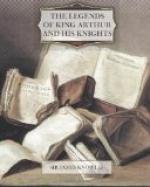Then was Sir Tristram long cherished by the King and Queen of Ireland, and ever with La Belle Isault. But on a certain day, while he was bathing, came the queen with La Belle Isault by chance into his chamber, and saw his sword lie naked on the bed: anon she drew it from the scabbard and looked at it a long while, and both thought it a passing fair sword; but within a foot and a half of the end there was a great piece broken out, and while the queen was looking at the gap, she suddenly remembered the piece of sword-blade that was found in the brain-pan of her brother Sir Marhaus.
Therewith she turned and cried, “By my faith, this is the felon knight who slew thy uncle!” And running to her chamber she sought in her casket for the piece of iron from Sir Marhaus’ head and brought it back, and fitted it in Tristram’s sword; and surely did it fit therein as closely as it had been but yesterday broke out.
[Illustration: And running to her chamber, she sought in her casket for the piece of iron ... and fitted it in Tristram’s sword.]
Then the queen caught the sword up fiercely in her hand, and ran into the room where Sir Tristram was yet in his bath, and making straight for him, had run him through the body, had not his squire, Sir Hebes, got her in his arms, and pulled the sword away from her.
Then ran she to the king, and fell upon her knees before him, saying, “Lord and husband, thou hast here in thy house that felon knight who slew my brother Marhaus!”
“Who is it?” said the king.
“It is Sir Tristram!” said she, “whom Isault hath healed.”
“Alas!” replied the king, “I am full grieved thereat, for he is a good knight as ever I have seen in any field; but I charge thee leave thou him, and let me deal with him.”
Then the king went to Sir Tristram’s chamber and found him all armed and ready to mount his horse, and said to him, “Sir Tristram, it is not to prove me against thee I come, for it were shameful of thy host to seek thy life. Depart in peace, but tell me first thy name, and whether thou slewest my brother, Sir Marhaus.”
Then Sir Tristram told him all the truth, and how he had hid his name, to be unknown in Ireland; and when he had ended, the king declared he held him in no blame. “Howbeit, I cannot for mine honour’s sake retain thee at this court, for so I should displease my barons, and my wife, and all her kin.”
“Sir,” said Sir Tristram, “I thank thee for the goodness thou hast shown me here, and for the great goodness my lady, thy daughter, hath shown me; and it may chance to be more for thy advantage if I live than if I die; for wheresoever I may be, I shall ever seek thy service, and shall be my lady thy daughter’s servant in all places, and her knight in right and wrong, and shall never fail to do for her as much as knight can do.”
Then Sir Tristram went to La Belle Isault, and took his leave of her. “O gentle knight,” said she, “full of grief am I at your departing, for never yet I saw a man to love so well.”




